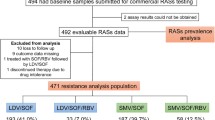Abstract
Purpose of Review
This review provides an overview of HCV resistance-associated substitutions (RASs) with a focus on NS3 protease and NS5A inhibitor resistance. Treatment approaches for managing resistance are also covered including the use of newly approved therapies with improved resistance profiles.
Recent Findings
HCV RASs are frequently selected if the patient is not cured during treatment; NS5A RASs persist for prolonged periods of time (years) after treatment failure and may adversely impact retreatment responses. Newly approved regimens with improved potency and resistance profiles are less impacted by resistance and provide the best retreatment options for patients who previously failed DAA therapy.
Summary
The clinical impact of HCV RASs has been lessened significantly with the introduction of new DAA treatment regimens. Routine testing for resistance is unlikely to impact retreatment approaches if newer regimens are accessible. Knowledge of factors, such as the presence of cirrhosis and prior treatment regimens, remain as the key to optimizing retreatment approaches.
Similar content being viewed by others
References
Drug-Resistance Testing | Adult and Adolescent ARV Guidelines. AIDSinfo Available at: https://aidsinfo.nih.gov/. (Accessed: 25th August 2016).
Abram ME, Ferris AL, Shao W, Alvord WG, Hughes SH. Nature, position, and frequency of mutations made in a single cycle of HIV-1 replication. J Virol. 2010;84:9864–78.
Roberts JD, Bebenek K, Kunkel TA. The accuracy of reverse transcriptase from HIV-1. Science. 1988;242:1171–3.
Cuevas JM, González-Candelas F, Moya A, Sanjuán R. Effect of ribavirin on the mutation rate and spectrum of hepatitis C virus in vivo. J Virol. 2009;83:5760–4.
Ho DD, et al. Rapid turnover of plasma virions and CD4 lymphocytes in HIV-1 infection. Nature. 1995;373:123–6.
Perelson AS, Neumann AU, Markowitz M, Leonard JM, Ho DD. HIV-1 dynamics in vivo: virion clearance rate, infected cell life-span, and viral generation time. Science. 1996;271:1582–6.
Neumann AU, et al. Hepatitis C viral dynamics in vivo and the antiviral efficacy of interferon-alpha therapy. Science. 1998;282:103–7.
Bukh J, Miller RH, Purcell RH. Genetic heterogeneity of hepatitis C virus: quasispecies and genotypes. Semin Liver Dis. 1995;15:41–63.
Smith DB, et al. Expanded classification of hepatitis C virus into 7 genotypes and 67 subtypes: updated criteria and genotype assignment web resource. Hepatol. Baltim Md. 2014;59:318–27.
Hemelaar J. The origin and diversity of the HIV-1 pandemic. Trends Mol Med. 2012;18:182–92.
Simmonds P. Genetic diversity and evolution of hepatitis C virus—15 years on. J Gen Virol. 2004;85:3173–88.
Messina JP, et al. Global distribution and prevalence of hepatitis C virus genotypes. Hepatol. Baltim Md. 2015;61:77–87.
Blach S, et al. Global prevalence and genotype distribution of hepatitis C virus infection in 2015: a modelling study. Lancet Gastroenterol Hepatol. 2017;2:161–76.
Chen Z-W, Li H, Ren H, Hu P. Global prevalence of pre-existing HCV variants resistant to direct-acting antiviral agents (DAAs): mining the GenBank HCV genome data. Sci Rep. 2016;6:20310.
Kuntzen T, et al. Naturally occurring dominant resistance mutations to hepatitis C virus protease and polymerase inhibitors in treatment-naïve patients. Hepatol. Baltim Md. 2008;48:1769–78.
Lontok E, et al. Hepatitis C virus drug resistance-associated substitutions: state of the art summary. Hepatol. Baltim Md. 2015;62:1623–32.
Krishnan P, Tripathi R, Schnell G, Reisch T, Beyer J. Pooled analysis of resistance in patients treated with ombitasvir/ABT-450/r and dasabuvir with or without ribavirin in phase 2 and phase 3 clinical trials. Hepatology. 2014;60:1134A–5A.
Wyles D, et al. Post-treatment resistance analysis of hepatitis C virus from phase II and III clinical trials of ledipasvir/sofosbuvir. J Hepatol. 2016; https://doi.org/10.1016/j.jhep.2016.11.022.
Lahser FC, Galloway A, Hwang P, Palcza J, Wahl J. Interim analysis of a 3-year follow-up study of NS5A and NS3 resistance-associated variants (RAVs) after treatment with grazoprevir-containing regimens in patients with chronic hepatitis C virus (HCV) infection. Hepatol. Baltim. Md. 2016;64:32A.
Abravanel F, Métivier S, Chauveau M, Péron J-M, Izopet J. Transmission of HCV NS5A inhibitor-resistant variants among HIV-infected men who have sex with men. Clin. Infect. Dis. Off. Publ. Infect. Dis. Soc. Am. 2016;63:1271–2.
Wyles D, et al. Long-term persistence of HCV NS5A resistance associated substitutions after treatment with the HCV NS5A inhibitor, ledipasvir, without sofosbuvir. Antivir Ther. 2017; https://doi.org/10.3851/IMP3181.
Sarrazin C, et al. Prevalence of resistance-associated substitutions in HCV NS5A, NS5B, or NS3 and outcomes of treatment with ledipasvir and sofosbuvir. Gastroenterology. 2016;0
Jacobson IM, Asante-Appiah E, Wong P, Black T, Howe AYM. Prevlence and impact of baseline NS5A resistance associated variants (RAVs) on the efficacy of elbasvir/grazoprevir (EBR/GZR) against GT1a infection. Hepatol Baltim Md. 2015;62:1393A–4A.
Zeuzem S, et al. NS5A resistance-associated substitutions in patients with genotype 1 hepatitis C virus: prevalence and effect on treatment outcome. J Hepatol. 2017; https://doi.org/10.1016/j.jhep.2017.01.007.
Poordad F, et al. MAGELLAN-1, part 2: glecaprevir and pibrentasvir for 12 or 16 weeks in patients with chronic hepatitis C virus genotype 1 or 4 and prior direct-acting antiviral treatment failure. J Hepatol. 2017;66:S83–4.
Bourlière M, et al. Sofosbuvir, velpatasvir, and voxilaprevir for previously treated HCV infection. N Engl J Med. 2017;376:2134–46.
Recommendations for Testing, Managing, and Treating Hepatitis C | HCV Guidance. Available at: http://hcvguidelines.org/. (Accessed: 1st September 2017).
Sullivan JC, et al. Evolution of treatment-emergent resistant variants in telaprevir phase 3 clinical trials. Clin. Infect. Dis. Off. Publ. Infect. Dis. Soc. Am. 2013;57:221–9.
Soumana DI, Kurt Yilmaz N, Ali A, Prachanronarong KL, Schiffer CA. Molecular and dynamic mechanism underlying drug resistance in genotype 3 hepatitis C NS3/4A protease. J Am Chem Soc. 2016;138:11850–9.
Afdhal N, et al. Ledipasvir and sofosbuvir for previously treated HCV genotype 1 infection. N Engl J Med. 2014;370:1483–93.
Forns X, et al. Grazoprevir and elbasvir plus ribavirin for chronic HCV genotype-1 infection after failure of combination therapy containing a direct-acting antiviral agent. J Hepatol. 2015;63:564–72.
Pilot-Matias T, et al. Resistance analysis in the MAGELLAN-1 study (part 2): glecaprevir/pibrentasvir therapy in HCV-infected patients who had failed prior DAA regimens containing NS3/4A protease and/or NS5A inhibitors. J Hepatol. 2017;66:S708–9.
Lenz O, et al. In vitro resistance profile of the hepatitis C virus NS3/4A protease inhibitor TMC435. Antimicrob Agents Chemother. 2010;54:1878–87.
Lahser FC, et al. The combination of grazoprevir, a HCV NS3/4A protease inhibitor, and elbasvir, a HCV NS5A inhibitor, demonstrates a high genetic barrier to resistance in HCV genotype 1a replicons. Antimicrob Agents Chemother. 2016; https://doi.org/10.1128/AAC.00051-16.
Lawitz EJ, Dvory-Sobol H, Yang JC, Stamm LM, Taylor JG. Characterization of HCV resistance from a 3-day monotherapy study of GS-9857, a novel pangenotypic NS3/4A protease inhibitor. Hepatol Baltim Md. 2015:566A–7A.
Pilot-Matias T, et al. In vitro and in vivo antiviral activity and resistance profile of the hepatitis C virus NS3/4A protease inhibitor ABT-450. Antimicrob Agents Chemother. 2015;59:988–97.
Jacobson IM, et al. Simeprevir with pegylated interferon alfa 2a plus ribavirin in treatment-naive patients with chronic hepatitis C virus genotype 1 infection (QUEST-1): a phase 3, randomised, double-blind, placebo-controlled trial. Lancet Lond Engl. 2014;384:403–13.
Kwo P, et al. Simeprevir plus sofosbuvir (12 and 8 weeks) in HCV genotype 1-infected patients without cirrhosis: OPTIMIST-1, a phase 3, randomized study. Hepatol. Baltim. Md. 2016; https://doi.org/10.1002/hep.28467.
Lawitz E, et al. Simeprevir plus sofosbuvir in patients with chronic hepatitis C virus genotype 1 infection and cirrhosis: a phase 3 study (OPTIMIST-2). Hepatol. Baltim. Md. 2015; https://doi.org/10.1002/hep.28422.
Jacobson IM, et al. Efficacy of 8 weeks of sofosbuvir, velpatasvir, and voxilaprevir in patients with chronic HCV infection: 2 phase 3 randomized trials. Gastroenterology. 2017; https://doi.org/10.1053/j.gastro.2017.03.047.
Wyles D, et al. No impact of RASs on the high efficacy of SOF/VEL/VOX for 8 weeks in DAA-naïve patients: an integrated resistance analysis of the POLARIS-2 and POLARIS-3 studies. J Hepatol. 2017;66:S303.
McCloskey RM, et al. Global origin and transmission of hepatitis C virus nonstructural protein 3 Q80K polymorphism. J Infect Dis. 2015;211:1288–95.
Sarrazin C, et al. No impact of RASs on the high efficacy of SOF/VEL/VOX for 12 weeks in DAA-experienced patients: an integrated resistance analysis of the POLARIS-1 and POLARIS-4 studies. J Hepatol. 2017;66:S299.
Wyles DL, Gutierrez JA. Importance of HCV genotype 1 subtypes for drug resistance and response to therapy. J Viral Hepat. 2014;21:229–40.
Ng T, et al. Resistance selection using glecaprevir and pibrentasvir in replicons of major hepatitis C virus genotypes. J Hepatol. 2017;66:S324.
Safety and antiviral activity of MK-5172, a novel HCV NS3/4a protease inhibitor with potent activity against known resistance mutants, in genotype 1 and 3 HCV-infected patients. Available at: http://www.natap.org/2010/AASLD/AASLD_34.htm. (Accessed: 1st September 2017).
Svarovskaia ES, et al. Infrequent development of resistance in genotype 1-6 hepatitis C virus-infected subjects treated with sofosbuvir in phase 2 and 3 clinical trials. Clin Infect Dis Off Publ Infect Dis Soc Am. 2014;59:1666–74.
Xu S, et al. In vitro selection of resistance to sofosbuvir in HCV replicons of genotype 1 to 6. Antivir Ther. 2017; https://doi.org/10.3851/IMP3149.
Hedskog C, et al. Evolution of the HCV viral population from a patient with S282T detected at relapse after sofosbuvir monotherapy. J Viral Hepat. 2015;22:871–81.
Nelson DR, et al. All-oral 12-week treatment with daclatasvir plus sofosbuvir in patients with hepatitis C virus genotype 3 infection: ALLY-3 phase III study. Hepatol. Baltim. MD. 2015;61:1127–35.
Foster GR, et al. Sofosbuvir and velpatasvir for HCV genotype 2 and 3 infection. N Engl J Med. 2015;373:2608–17.
Kwo PY, et al. Glecaprevir and pibrentasvir yield high response rates in patients with HCV genotype 1-6 without cirrhosis. J Hepatol. 2017; https://doi.org/10.1016/j.jhep.2017.03.039.
Cheng G, et al. Vitro antiviral activity and resistance profile characterization of the hepatitis C virus NS5A inhibitor ledipasvir. Antimicrob Agents Chemother. 2016;60:1847–53.
Wang C, et al. Hepatitis C virus RNA elimination and development of resistance in replicon cells treated with BMS-790052. Antimicrob Agents Chemother. 2012;56:1350–8.
Krishnan P, et al. In vitro and in vivo antiviral activity and resistance profile of ombitasvir, an inhibitor of hepatitis C virus NS5A. Antimicrob Agents Chemother. 2015;59:979–87.
Komatsu TE, et al. Regulatory analysis of effects of hepatitis C virus NS5A polymorphisms on efficacy of elbasvir and grazoprevir. Gastroenterology. 2017;152:586–97.
Lawitz EJ, et al. Clinical resistance to velpatasvir (GS-5816), a novel pan-genotypic inhibitor of the hepatitis C virus NS5A protein. Antimicrob Agents Chemother. 2016; https://doi.org/10.1128/AAC.00763-16.
Krishnan P, et al. Pooled resistance analysis in HCV genotype 1–6-infected patients treated with glecaprevir/pibrentasvir in phase 2 and 3 clinical trials. J Hepatol. 2017;66:S500.
Zeuzem S, Rockstroh J, Kwo P, Roth D, Lawitz E. Predictors of response to grazoprevir/elbasvir among HCV genotype 1 (GT1)–infected patients: integrated analysis of phase 2–3 trials. Hepatology. 2015;62:554A–5A.
Feld JJ, et al. Sofosbuvir and velpatasvir for HCV genotype 1, 2, 4, 5, and 6 infection. N Engl J Med. 2015;373:2599–607.
Forns X, et al. Glecaprevir plus pibrentasvir for chronic hepatitis C virus genotype 1, 2, 4, 5, or 6 infection in adults with compensated cirrhosis (EXPEDITION-1): a single-arm, open-label, multicentre phase 3 trial. Lancet Infect Dis. 2017; https://doi.org/10.1016/S1473-3099(17)30496-6.
Sarrazin C, et al. Effect of baseline resistance-associated variants on SVR with the 3D regimen with and without RBV in GT1A and GT1B-infected patients. J Hepatol. 2016;64:S214.
Hezode C, et al. Resistance analysis in 1284 patients with genotype 1 to 6 HCV infection treated with Sofosbuvir/Velpatasvir in the phase 3 Astral-1, Astral-2, Astral-3 and Astral-4 studies. J Hepatol. 2016;64:S399–400.
Author information
Authors and Affiliations
Corresponding author
Ethics declarations
Conflict of Interest
The author declares no conflicts of interest relevant to this manuscript.
Human and Animal Rights and Informed Consent
This article does not contain any studies with human or animal subjects performed by any of the authors.
Additional information
This article is part of the Topical Collection on Co-infections and Comorbidity
Rights and permissions
About this article
Cite this article
Wyles, D.L. Resistance to DAAs: When to Look and When It Matters. Curr HIV/AIDS Rep 14, 229–237 (2017). https://doi.org/10.1007/s11904-017-0369-5
Published:
Issue Date:
DOI: https://doi.org/10.1007/s11904-017-0369-5




